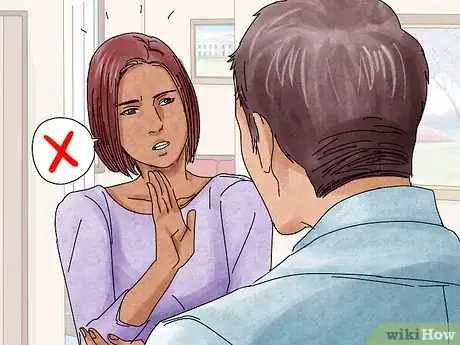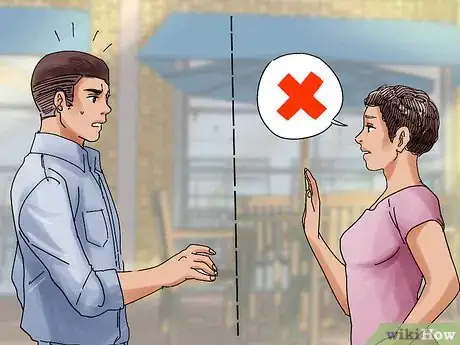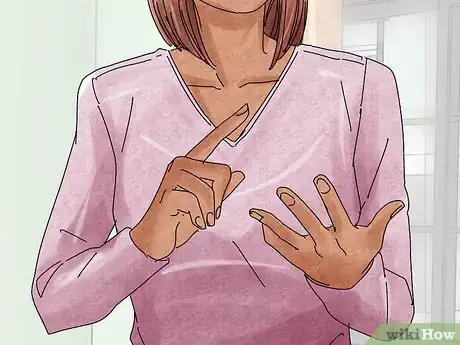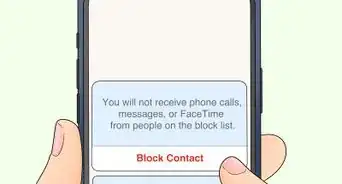This article was co-authored by Kelli Miller, LCSW, MSW. Kelli Miller is a Psychotherapist based in Los Angeles, California. Kelli specializes in individual and couples therapy focusing on relationships, depression, anxiety, sexuality, communication, parenting, and more. Kelli also facilitates groups for those struggling with alcohol and drug addiction as well as anger management groups. She is the author of “Professor Kelli’s Guide to Finding a Husband” and the award-winning and best-selling book “Thriving with ADHD”. Kelli co-hosted an advice show on LA Talk Radio and is a relationship expert for The Examiner. She received her MSW (Masters of Social Work) from the University of Pennsylvania and a BA in Sociology/Health from the University of Florida.
This article has been viewed 64,670 times.
Your friend is dating a guy who flirts with you, hits on you, or says inappropriate things to you. You feel uncomfortable around him, but don't know if you should confront him and don’t want to hurt your friend. If you can confront the behavior with both of them early on and as flirting continues to happen, you'll send a clear message that you find his flirting inappropriate.
Steps
Confronting Flirting Early On
-
1Make sure it's flirting. Before reacting to flirting prematurely, make sure he's really flirting and not just being friendly. Does he have a flirty personality or is he just being overly friendly? Notice if he's like this around all women or just you. Notice if it only happens in the context of alcohol, or when you are alone.[1]
-
2Tell him to stop in the moment.[2] Let your friend's boyfriend know early on, as soon as possible, that his flirting behavior is unacceptable. By doing so, you'll be sending a message that his behavior won't be tolerated and cannot continue. This will hopefully keep the flirting from escalating.
- For example, if he flirts with you while you're at a party with all of your friends, you can simply say, "Please stop touching my hands," or, "Please stop commenting on how I look." You can follow that with: "I don't like it and your girlfriend is right over there."
Advertisement -
3Mention the flirting to your friend.[3] Chances are, your friend has noticed what's happening or has heard about it from other friends. Talk to her early on so that she doesn't get the wrong idea about who's to blame for the flirting. After he flirts with you, you can just mention it to her in passing to let her know you feel uncomfortable or put off by it. Try to make her feel at ease and to have it not be too serious of a conversation, especially if he hasn't flirted with you that often.
- You can say, "Hey, I was really uncomfortable with your boyfriend was just flirting with me at the party. I'm sorry to mention it, but maybe he was just nervous or drinking too much?"
-
4Set boundaries. If he makes a habit of continuing to flirt with you, try setting boundaries with him. You can do this on your own or by verbally setting the boundary with him. For example, you could:
- Make sure you’re not alone with him.
- Schedule a girls’ night only time with your friend.
- Walk away when he tries to flirt with you.
- Say, "I am asking you to stop touching me. It makes me uncomfortable."
- Tell him, "Do not call or text me anymore. If you continue, I'm going to block your number and show the texts to your girlfriend."
-
5Observe what happens next. Hopefully once you’ve mentioned it to both of them and tried setting boundaries, the flirting behavior will stop. Keep an eye on what he does the next few times he's around you, but hopefully he listened or your friend will take care of the situation herself. If the following circumstances occur, you’ll definitely want to confront him and your friend again about his behavior:[4]
- He starts acting more flirty or inappropriate with you, even after you told him to stop.
- He stops flirting with you, but starts up with another friend in your group.
- He tries to blame the flirting on you.
Handling Chronic Flirting
-
1Confront him again. If you’ve tried enforcing your boundaries, told him to stop in the moment, and talked with your friend, but his flirting continues to make you uncomfortable, confront him directly. He genuinely might not mean to offend you, but the bottom line is that you still feel uncomfortable and don’t want your friend to get hurt. Be clear and direct about what specific behavior you find inappropriate. Let him know he can expect you to talk to your friend about it if he does not stop — and follow through with this consequence.[5]
- You can say, “You’ve been flirting with me, touching me inappropriately, and making sexualized comments. I am uncomfortable with that and I want you to stop.”
-
2Deal with his response. Once you’ve confronted him directly, he could react in any number of ways. No matter what he says or how he reacts, it’s important to be firm with him and repeat that you’re uncomfortable with his flirting and want it to stop. Try not to comfort him or argue with him, just take note of what his emotional response is. You can likely expect some of the following reactions from him:[6]
- Denial that he’s been flirting.
- Blaming you for flirting with him first or leading him on.
- Anger or fear that you’ll tell on him.
- Embarrassment or shame for his behavior.
-
3Talk to your friend. You’ll have to be gentle, honest, and careful of what you say, but you need to tell her the flirting has continued. Find some time to sit down with her one-on-one and give her an account of her boyfriend’s actions, how you responded or told him to stop, and how it’s made you feel uncomfortable.[7]
- You can say, “I really care about you and our friendship, but I need to talk to you about Dan again. When you’re not around, he’s been touching my hair, flirting with me, and making sexually inappropriate comments. I tried to let it go, but he kept doing it, so I decided to talk to him about it. I’ve told him to stop several times and have tried to stay away from him, but he keeps doing it and I’m really uncomfortable. I’m sorry if this hurts you, but I just wanted you to know.”
- Avoid saying anything judgmental, like: “Your boyfriend is creepy,” or, “Your boyfriend is such a jerk.”[8]
-
4Give your friend time. After hearing about her boyfriend’s behavior toward you (and possibly others), give your friend some time to process. She might be a little upset, defensive or angry at you at first.[9] She might even try to blame you or take his side. Give her time to collect her thoughts and deal with her boyfriend on her own.[10]
- Keep in mind that if she’s a good friend, she’ll realize you weren’t at fault and just had her best interests at heart.
-
5Respect her decision. Your friend may decide to stay with her boyfriend and/or she may decide to keep some distance from you. Either way, you need to respect her decision and allow her to deal with her relationship on her own; however, you’ll need to make your own decision about if you can be around the both of them. If she decides to stay with him, consider:
- Keeping a dialogue open between you and her if his flirting continues.
- Spending less time with your friend when her boyfriend is with her.
- Having an exit plan for parties or events when you’re with both of them.
- Communicating with them right away if he violates your boundaries.
- Leaving the friendship if his behavior escalates to something physical.
Protecting Yourself
-
1Keep a record. Notice and mentally keep track of instances when he’s flirted with you (or even write it down if you need to). It may help to reflect on exactly how things happened and what your response was in case you've confronted him and he does nothing.[11] Some questions to ask yourself include:
- Where and when has he flirted with you?
- What is he saying? Is he making sexually inappropriate comments, or just complimenting you?
- Was he intoxicated during the flirting?
- Has he attempted to or actually touched you/kissed you?
- Has the flirting occurred in front of your friend or behind her back?
- Has he been flirting with other friends or other people too?
- How did you respond to him when he flirted with you?
-
2Stop your own flirting. Think about if you find him attractive. If so, you could have unintentionally flirted with him and encouraged him to flirt with you. Reflect on your interactions with him and examine if you sent him mixed signals or actively flirted with him yourself. Some flirty behavior you might want to avoid includes:[12] [13]
- Smiling at him excessively.
- Winking at him.
- Touching him, particularly grabbing or rubbing his arms, hands, or knees.
- Laughing at all of his jokes.
-
3Confer with other friends. Seek support from other friends who know your friend and her boyfriend. It could be they have been experiencing the same behavior from him and have been too embarrassed to talk about it. Even if not, they will be able to help support you and figure out what to do next. Practice what you’d like to say to the boyfriend with your other friends — this will give you a confidence boost and will help keep you focused and strong when it comes time to confront him.[14]
-
4Get over the worry of hurting your friendship. You need to get over the worry of hurting your friendship, hurting your friend’s feelings, and/or hurting her relationship with her boyfriend. Put yourself in your friend’s shoes and think about if you’d want to know if your boyfriend was acting that way toward others. You’d likely want to know about the character of a boyfriend and how he was treating your friends, so do her the same favor.[15] If she doesn't believe you, she may not be a good friend to keep.
Warnings
- It is never okay for someone to grab you or get physical with you without your consent. Be firm that it’s not okay with you for him to touch you in any way. If he and your friend cannot respect that you have physical boundaries, do not be around them.⧼thumbs_response⧽
References
- ↑ http://www.telegraph.co.uk/women/sex/relationship-advice-and-romance/11205526/My-best-friends-boyfriend-keeps-groping-me.-Should-I-tell-her.html
- ↑ Kelli Miller, LCSW, MSW. Psychotherapist. Expert Interview. 27 October 2021.
- ↑ Kelli Miller, LCSW, MSW. Psychotherapist. Expert Interview. 27 October 2021.
- ↑ http://www.telegraph.co.uk/women/sex/relationship-advice-and-romance/11205526/My-best-friends-boyfriend-keeps-groping-me.-Should-I-tell-her.html
- ↑ http://www.telegraph.co.uk/women/sex/relationship-advice-and-romance/11205526/My-best-friends-boyfriend-keeps-groping-me.-Should-I-tell-her.html
- ↑ http://www.telegraph.co.uk/women/sex/relationship-advice-and-romance/11205526/My-best-friends-boyfriend-keeps-groping-me.-Should-I-tell-her.html
- ↑ Kelli Miller, LCSW, MSW. Psychotherapist. Expert Interview. 27 October 2021.
- ↑ http://www.womansday.com/relationships/family-friends/tips/a2465/7-things-your-best-friend-wont-tell-you-118080/
- ↑ Kelli Miller, LCSW, MSW. Psychotherapist. Expert Interview. 27 October 2021.
- ↑ http://www.glamour.com/story/readers-dilemma-help-my-friend
- ↑ http://www.telegraph.co.uk/women/sex/relationship-advice-and-romance/11205526/My-best-friends-boyfriend-keeps-groping-me.-Should-I-tell-her.html
- ↑ http://www.shape.com/lifestyle/sex-and-love/how-be-friendly-not-flirty-male-friends
- ↑ http://www.cosmopolitan.com/sex-love/advice/a3294/friend-flirts-with-husband/
- ↑ http://www.telegraph.co.uk/women/sex/relationship-advice-and-romance/11205526/My-best-friends-boyfriend-keeps-groping-me.-Should-I-tell-her.html
- ↑ http://www.womansday.com/relationships/family-friends/tips/a2465/7-things-your-best-friend-wont-tell-you-118080/











































































Medical Disclaimer
The content of this article is not intended to be a substitute for professional medical advice, examination, diagnosis, or treatment. You should always contact your doctor or other qualified healthcare professional before starting, changing, or stopping any kind of health treatment.
Read More...